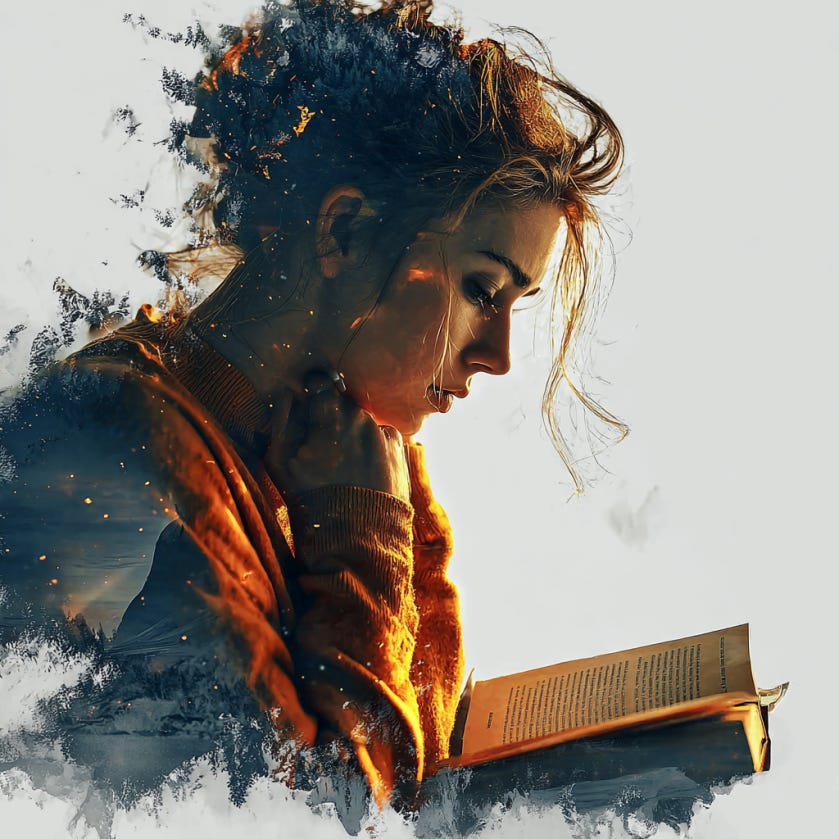🧠 What if that story that made you cry was written with ChatGPT?
On AI, creativity, and why “effort” is overrated
You’re halfway through a novel that’s hitting you right in the gut. It’s beautiful. Honest. Maybe even painful. You close the book for a second, dry your eyes, and then you read: “written with AI.”
Would you feel cheated?
Would the story mean less?
Would the emotion vanish just because you now know how it was made?
In a conversation between Italian creators Matt Giachi and Raffaele Gaito (full conversation here), one truth came up that’s becoming harder and harder to ignore:
👉 AI is quickly becoming the most powerful creative tool of our time.
And yet, we still hear:
"Ah, you did it with AI?"
"Did ChatGPT write this?"
We’ve heard this tone before.
For some, using it still feels like cheating. Like cutting corners. Like whatever you made isn’t fully yours anymore.
But still, they don't say (anymore):
🖊️ “It doesn’t count, you Googled it instead of going to the library.”
🧱 “If your project was designed with a software instead of hand-drawn with pencil and ink, you’re not a real architect or engineer.”
🖌️ “Photoshop? No thanks, real art is made with egg tempera on wooden panels.”
But here's the thing: creativity isn’t about pain. Art isn’t just about effort.
Design isn’t noble because it’s hard.
👉 What matters is the effect. The feeling. The impact.
What it leaves behind in the person who experiences it.
Gaito puts it perfectly:
“Why on earth should this matter? It would be like saying: you’ve just bought a record, and the store owner tells you, ‘Wait a second, I need to warn you — the guy who made this didn’t study at the conservatory, doesn’t know how to play the piano, and did everything with software.’ Is it important that you go home knowing this before listening to the music? Or should you just go home, listen to it, and be moved by it?”
The question isn’t “Did you use AI?”
The question is “Did it work?”
Did it resonate, stir something, stay with you after the lights were off?
It’s not scandalous to use a language model to explore metaphors, brainstorm titles, or spark your creativity when you hit a wall.
What’s scandalous is switching off your brain and expecting the machine to do the thinking for you.
Or worse, refusing to learn how to use it — and then blaming it for being bad.
But that’s not an AI problem. That’s a human problem.
“That’s why I say: be careful with this idea — because flash forward ten years, we’ll be talking about ‘AI artists’ the same way we talk about ‘digital artists’ today, without scandal. We’ll go enjoy a photography exhibition without needing to compare it to Caravaggio. It’s simply another form of art, as long as it moves us.”
What makes something art is not the method.
It’s what it awakens in us.
And the tools will keep changing.
👉 What do you think?
Will we all switch off our brains — or will we use these tools to make our lives better? 😉
I'm always curious to hear different perspectives — feel free to share yours in the comments. I read everything and reply to everyone.
—
💬 This post sparked a wide and thoughtful conversation on LinkedIn, and I wanted to add some of the insights that emerged directly here.
Some readers shared how, in their creative paths, they’ve encountered skepticism anytime they embraced a new tool — from graphic tablets in illustration to AI-assisted writing. And yet, history shows that resistance to change is nothing new: Pollock with his dripping technique, Duchamp with readymades — innovation always faces pushback before it becomes canon.
In the world of photography, tools like Photoshop and Lightroom — powered by AI systems like Adobe Sensei — have long been part of the creative workflow. Are they any less valid? Most would say no. Which proves the point: when a tool becomes familiar, the fear fades. Until then, we debate.
There was also an important reminder that AI should never replace the core of an artist’s voice. It’s a tool — not a crutch. Just like a paintbrush doesn’t make the painting, AI doesn’t make the message. The true power still lies in the choices we make and the intent we carry.
One comment sparked a thought: that what matters is not whether we call it "AI art" or "digital art" or "traditional art" — but whether it moves us. Maybe it’s not about categories at all. Maybe it’s about coexistence.
So here’s to a creative world where tools are embraced, not feared. Where experimentation is encouraged. And where art continues to transform and evolve ✨
✍️ I'm a B2B marketer exploring how AI is reshaping creativity, communication, and the way we work. If you're building a business and want to use these tools with clarity and impact — let’s connect.



Reminds me of what I told someone else.
I care about good writing. Not human writing.